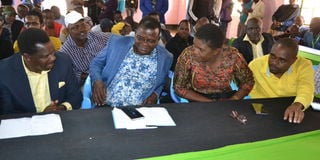Men dominate elective positions in Tharaka Nithi

From left: Newly elected Tharaka Nithi County leaders Muthomi Njuki (governor), Mwenda Gataya (senator), Susan Ngugi (woman rep) and Patrick Munene (Chuka/Igambang’ombe MP) at Chiakariga Girls High School on August 12, 2022. Men continue to dominate political leadership in the county.
Despite spirited efforts to empower women to take up leadership roles in the country, Tharaka Nithi County remains a patriarchal society where men have continued to dominate in elective positions.
Apart from the woman's representative seat which is reserved for women, only two women — Anita Mbae (Mariani) and Gatiria Mbae (Ganga) — were elected to be members of county assembly (MCAs) in the county’s 15 wards.
The only two women who were running for Member of Parliament (MP) positions — Salome Ruteere, an independent candidate (Maara) and Mercy Kirito Mutegi of the Jubilee Party (Chuka/Igambang’ombe) — did not even come near victory.
In the 2017 general elections, only three women MCAs were elected — Susan Ngugi (Marimanti), Njeri Kigwari (Igambang’ombe) and Margaret Gitari (Chogoria).
There were six candidates running for governorship in the just concluded polls and none had picked a woman as a running mate while all the five senatorial contenders were men.
Running mates
This is despite the Maendeleo Ya Wanawake leadership pleading with the men seeking governorship to pick women as their running mates and promising to rally behind any of them who considered the appeal.
Even in the 2013 and 2017 general elections, no woman in the county contested for gubernatorial and senatorial seats and the region has never produced a woman MP since 1963.
A total of six women scrambled for the woman representative’s position which was won by Ms Ngugi of The Service Party.
The outdated traditions and cultural practices including female genital mutilation whose prevalence rate has remained high over the years are mainly to blame for the empowerment challenges that are facing women in the region.
Tharaka Nithi Maendeleo ya Wanawake chairperson Anicenta Kiriga argues that the community is yet to believe that women can lead.
Male influence
She adds that women also fear facing men in elective contests because the latter have money and ‘male’ influence that gives them an upper hand.
“Women have no money because even family property belongs to men irrespective of the woman’s contribution. Women also fear facing the influential men in the political contest that is very rough,” said Ms Kiriga.
She adds that the Ameru culture that compels women to be submissive to men discourages them from seeking elective positions which require one to be very firm and authoritative.





